Daniel Swift
I feel as though I came late to the Sarah Moss party. Nobody told me she was this divided country’s most urgent novelist. Her themes: the cycles of history, male absurdity, the forms female subversion may take, in irony, sickness and sacrifice. It helps that she’s absurdly topical, and that she’s funny. Her new book, Ghost Wall (Granta, £12.99), is the shorter, spikier companion piece to her previous novel, The Tidal Zone. It is about ancient Britain and its re-enactment in the present day, and like all the novels I’ve loved best this year, it’s also a parable.
Other parables: I was hugely moved by Jesse Ball’s allegorical Census (Granta, £14.99), about love and Down’s Syndrome, and am so glad that the austere Australian fabulist Gerald Murnane is getting the wide attention he deserves.
Sara Wheeler
I gulped down Last Stories by William Trevor (Viking Penguin, £14.99). Up to his usual stellar standard but, as we lost him two years ago, the pages sang like a threnody. Is it possible that there won’t ever be another Trevor to look forward to? I shall have to start at the beginning again and work my way through the oeuvre.
I greatly enjoyed the ruminative, gothic travelogue The Immeasurable World: Journeys in Desert Places by William Atkins (Faber, £20). Besides the Gobi, Atkins tackles a sliver of the fearsome 370,000-sqkm Taklamakan. It’s a vital topic. ‘It has been estimated,’ he writes, ‘that desertification affects a sixth of humankind and 70 per cent of all arid areas.’ The book is as much history as travelogue.
The welcome trend for rewriting myths produced Pat Barker’s The Silence of the Girls (Hamish Hamilton, £18.99), which is the Iliad from a female perspective. I loved it.
Mark Cocker
It has been a fishy year for me, and Charles Rangeley-Wilson’s terrific Silver Shoals: Five Fish That Made Britain (Chatto, £18.99) is among its highlights. The author manages to lay bare this country’s abuse of its astonishing former fish abundance, but without name-calling or losing his sense of simple wonder at fish as vital, vibrantly wild inhabitants of our encircling seas and waters.
In turn, his book led me to reread Tom Fort’s classic The Book of Eels, published in 2003. Fort is narrower in scope but deeper and, aided by what is arguably the most slippery, strange but fascinating fish species on Earth, he more completely conjures the mysteriousness of what lies beneath.
Marcus Berkmann
I read non-fiction for work and fiction for fun. This year’s discoveries for me were the spy novels of Mick Herron and the later, more abstract works of the science-fiction writer Christopher Priest. Herron’s Jackson Lamb books are mesmerisingly good, combining the best double, triple and quadruple-crossing traditions of Len Deighton and early Le Carré with the mordant humour of Reginald Hill’s Dalziel and Pascoe novels.
Priest, who is now 76, has been writing a lot about an invented place he calls The Dream Archipelago. The Islanders (2011) is an ingenious book of short stories masquerading as a travelogue; The Adjacent (2013) is utterly bizarre, and I may have to reread it soon to work out what it’s about; and The Gradual (2016) is the next novel I intend to start, after I’ve got all this bloody work out of the way.
A.N. Wilson
James Pope-Hennessy’s Life of Queen Mary was the best 20th-century royal biography. Hugo Vickers bought a copy as a schoolboy and has been an obsessive royal-watcher ever since. In The Quest for Queen Mary (Zuleika, £30),Vickers gathers up the interviews and conversations with the queen’s friends and relations, collected by Pope-Hennessy, which were too indiscreet to be included in his masterpiece. Almost every page is a gem, but the chapter about Henry Duke of Gloucester must be one of the most hilarious pieces of English prose in our language.
Two other superb royal books: Lucy Worsley’s Queen Victoria: Daughter, Wife, Mother, Widow (Hodder, £25) has much of the abundant charm of its author; and Frances Welch’s The Imperial Tea Party (Short Books, £12.99), recounting visits from the Russian royal family to their English cousins, is poignant and comic in equal measure.
Claire Lowdon
The Life of Saul Bellow: Love and Strife, 1965–2005 by Zachary Leader (Cape, £35).On his deathbed, Bellow asked a friend: ‘Was I a man or a jerk?’ In the second and final volume of his meticulously objective biography, Leader resists the temptation to answer that question. Instead, he gives us all the information from every angle, rewarding the patient reader with a multi-dimensional portrait of this contradictory, conflicted, brilliant, difficult human being. And although this is a big book, it’s actually a miracle of compression and clarity, given the size of the life. Best of all, Leader always makes time to remind us why we’re here: for the work itself, which he quotes from generously and with relish. Whatever you think of Bellow the man, you’ll find it impossible not to agree with Leader’s moving conclusion that ‘the fiction is his great gift — the great gift of his life’.
Honor Clerk
Three books about books. Edward Wilson-Lee’s The Catalogue of Shipwrecked Books (William Collins, £25), the fascinating history of Christopher Columbus’s illegitimate son Hernando, guardian of his father’s flame, courtier, bibliophile and cataloguer supreme, whose travels took him to the heart of 16th-century Europe. Lulah Ellender’s Elisabeth’s Lists (Granta, £16.99), the story of the author’s grandmother, whom she never met, improbably conjured up from the books of household lists she kept as a diplomat’s daughter and wife — an intelligent and moving family narrative. And, finally, a life organised by books: Sally Bayley brought herself up with the aid of Milly Molly Mandy, Betsey Trotwood, Jane Eyre and Miss Marple and tells her extraordinary story in Girl with Dove (William Collins, £14.99). Brilliantly original, funny and clever.
Nicky Haslam
Foremost is Hugo Vickers’s meticulously annotated The Quest for Queen Mary (Zuleika, £30), and Cressida Connolly’s elegiac After the Party (Viking, £14.99). Adam Zamoyski refreshingly downsizes the Corsican commander-in-chief in his Napoleon: The Man Behind the Myth (William Collins, £30). New to me, but first published in 1647, is Baltasar Gracián’s Pocket Oracle and the Art of Prudence, edited by Jeremy Robbins (Penguin Classics, £9.99): every maxim a lesson for our time. Worst book of the year? Hmmm. Perhaps Andrew Morton’s fatuous Wallis in Love (Michael O’Mara, £20).
Susan Hill
The law is endlessly fascinating, in its history, rituals, manners, language and, above all, in the people whose lives revolve, temporarily or in the long term, around its practise. In Your Defence: Stories of Life and Law by the barrister Sarah Langford (Doubleday, £16.99) tells the stories of some of those caught up in its complex workings. It is riveting — and quite alarming.
Best novel this year by a country mile is Normal People by Sally Rooney (Faber, £13.99), the work of an Irish novelist who has sprung from nowhere to both literary eminence and great popularity in two books. Her characters are those non-existent ‘ordinary people’, whose emotions, relationships and daily lives she reveals with sympathy and understanding but also cool detachment. Brilliant.
How many biographers can entirely change not one’s view of their subject but what you might call ‘the universal view,’ and do so with carefully, calmly presented evidence? I daresay many like me, with an interest beyond the casual in Tudor history, thought they had Thomas Cromwell sewn up. Diarmaid MacCulloch has blown our view apart with his long, absorbing and exciting Thomas Cromwell: A Life (Allen Lane, £30). A masterpiece of scholarship and my read of the year.
Graham Robb
Having just binge-read seven novels by Haruki Murakami, I’m expecting his latest, Killing Commendatore (Harvill Secker, £20), to be my book of the year, but I think I’m getting it for Christmas, so I’ll have to wait. It has received the accolade of a Class II: Indecent Materials rating from the Hong Kong Obscene Articles Tribunal.
Among the books I have read, I admired Éric Vuillard’s Goncourt Prize-winning novel The Order of the Day (Picador, £12.99), a fly-on-the-wall account, with occasional flights of fancy, of the part played by captains of industry in Hitler’s rise.
Olivier Rolin’s Stalin’s Meteorologist (Harvill Secker, £8.99) tells the painfully engrossing tale of Alexey Wangenheim, a patriotic pioneer of wind power. It is based on the letters and drawings he sent to his wife and daughter from the Arctic gulag to which he was inexplicably banished by his hero, Comrade Stalin.
William Dalrymple
In his magisterial The British in India (Allen Lane, £30), David Gilmour draws on more than 30 years of research in the archives. Here he presents an astonishing harvest from diaries, memoirs, letters and official documents of the period, many previously unused. Prostitutes and punkah wallahs, pig-stickers, pagoda-hunters and viceregal palaces — all British colonial life in India is here presented in elegant prose: 350 years of battles and durbars, maharajahs’ balls, tiger shoots and Simla shenanigans distilled in 600 pages of telling anecdotes and witty vignettes.
Manaku of Guler: The Life and Work of Another Great Indian Painter from a Small Hill State (Niyogi Books, £73), by India’s leading art historian, B.N. Goswamy, completes his lifetime of labour researching the most talented of all the families of artists at work in India in the 18th century. The book closes a diptych that he opened two decades ago with the publication of Nainsukh of Guler: A Great Indian Painter from a Small Hill State.
The pleasure of reading Manaku of Guler derives in part from discovering the extraordinary painting of this forgotten genius, as he brings into visual form some of the most subtle of Indian philosophical texts; but equally in Goswamy’s close reading of the images, and the amount of information he manages to wring out of them. He notices, for example, that when Radha instructs Krishna to paint her breasts with sandalwood paste, Krishna does so using his left hand: ‘Is it possible,’ asks Goswamy, ‘that it was not Krishna but Manaku who was actually left-handed?’
Andrew Taylor
Claire Fuller’s Bitter Orange (Penguin, £14.99) is a beautifully written novel, mainly set 50 years ago in a decaying stately home where three youngish people play out their doomed hopes and sinister fantasies during a long, hot summer. There are echoes of Barbara Vine and Daphne du Maurier here and also, faint but curiously insistent, of Barbara Pym. C.J. Sansom’s Tombland (Mantle, £20), the seventh novel in his bestselling Shardlake series, is technically a murder mystery. In practice, it is also an enthralling fictional account of Kett’s Rebellion, the
little known and even less understood 1549 insurrection.
Finally, if you are a fan of Mick Herron’s wonderful Slough House spy novels, there is a Christmas treat available in the form of The Drop (John Murray, £9.99). A wry and elegant novella about what happens to redundant spooks.
Ruth Scurr
Because Christmas is a terrible challenge for all who suffer from eating disorders, I am choosing Laura Freeman’s The Reading Cure: How Books Restored My Appetite (Weidenfeld, £16.99). This is not a misery memoir or self-help book but a joyful celebration of literature and a candid account of how reading about other people enjoying real or fictional meals helped Freeman recover from anorexia.
Vicarious enjoyment of food, which can take many forms, including studying recipe books, obsessively watching Bake Off or cooking elaborate meals for friends and family without participating in them, is common among anorexics. Freeman transforms this into a real pathway to recovery. Inviting her readers to share picnics, feasts, good suppers and strong teas, she takes them on a quirky literary journey, from Richard Jeffries’s Bevis to Joanne Harris’s Chocolat. And of course the Cratchits’ Christmas pudding is included.
Sam Leith
More and more I find I look above all else in fiction for sureness of touch with sentences — and that was abundantly in evidence, in different ways, in Michael Ondaatje’s Warlight (Cape, £16.99) and in Catherine Lacey’s short story collection Certain American States (Granta, £12.99). Ondaatje’s is an elliptical and atmospheric hybrid of family story and second world war spy caper; Lacey’s an often very funny collection of anxiously talky stories about people in crises of one sort or another. But both of them have the unmistakable stamp of knowing exactly what they’re doing. I was also struck by the compressed farce and horror in the 1951 Dutch novella An Untouched House by Willem Frederik Hermans, in David Colmer’s new translation (Pushkin, £7.99).
In non-fiction, Paul Kildea’s Chopin’s Piano: A Journey Through Romanticism (Allen Lane, £20) was fascinating, even for a musical ignoramus like me. I also tip my cap to Andrew Roberts’s Churchill: Walking With Destiny (Allen Lane, £35). I’m sick to death of Churchill and did not welcome yet another book about him, especially with that subtitle, yet Roberts’s telling is so fresh it utterly won me over.
Jane Ridley
Who’s In, Who’s Out: The Journals of Kenneth Rose Volume I edited by D.R. Thorpe (Weidenfeld, £30). An insider’s account, this gossipy and acute diary will become the indispensable guide to the Establishment in the years between 1944 and 1979.
I have enjoyed two books published in paperback this year. Kathryn Hughes’s Victorians Undone (4th Estate, £9.99), a collection of stunningly original and thought-provoking essays about such unexpected subjects as Darwin’s beard or George Eliot’s hand. And Nicholas Shakespeare’s Six Minutes in May (Vintage, £9.99) is interesting not just for the story of Churchill’s incredibly unlikely ascent to the premiership but also for the way in which the author uses his novelist’s skills to write a gripping and original historical narrative.
James Walton
My favourite novel of this year was Tim Winton’s blistering The Shepherd’s Hut (Picador, £14.99): a miraculously assured combination of beguiling narrative voice, wild landscape, page-turning plot and characters that are simultaneously archetypal and utterly individual. I also much enjoyed Now We Shall Be Entirely Free (Sceptre, £18.99), in which Andrew Miller returned to more orthodox historical fiction after 2015’s The Crossing and triumphantly proved there’s plenty of life in the old form yet. Finally, A.J. Finn’s The Woman at the Window (HarperCollins, £12.99) took the conventions of a psychological thriller and gave them both literary polish and real heart.
Richard Ingrams
It sometimes seems as though a new Donald Trump book is being published every week, but we ought not to forget the pioneering Michael Wolff, whose Fire and Fury (Little, Brown, £20) was the first to give a frighteningly vivid picture of the leader of the free world — ‘twinkle in his eye, larceny in his soul’: an ignorant inattentive hoodlum who likes to spend his evenings watching three TV screens at once while guzzling cheese-burgers. Though published this year, Wolff’s masterpiece now reads like ancient history, with many of the pieces swept from the board, notably the improbable figure of Steve Bannon, self-styled ‘Trump’s brain’, who put the words into the President’s mouth, notably his outlandish inauguration speech. ‘What weird shit is this?’, George W. Bush was heard to murmur. A comment that seems to sum up Trump’s regime.
Tom Bower tried to be on his best behaviour with his biography of Prince Charles, Rebel Prince (William Collins, £20). But though he made a commendable attempt to see good in the heir to the throne he could not hope to dispel the impression left with his readers that Charles is every bit as weird as Trump. One can overlook, perhaps, the eccentricities that Bower describes — the special cushions and loo seats that accompany the Prince on his travels — but what is one to make of his belief in the ‘sacred geometry of the body’, or his recommendation that coffee enemas could be effective in the treatment of cancer? Bush’s words, however crude, seem the only appropriate response.
Jonathan Sumption
As a general rule, biography is a poor way to learn history. Concentrating on a single life oversimplifies the complex texture of events. But there are exceptions, and two of them were published this year. One is Julian Jackson’s A Certain Idea of France (Allen Lane, £35), the best biography of De Gaulle in any language and the latest evidence of Anglo-Saxon domination in the field of modern French history. The other is Diarmaid MacCullough’s Thomas Cromwell (Allen Lane, £30), a real history to supplant the historical fictions that surround Henry VIII’s great minister. Both of these books manage to study events through a life, and not the other way round. Both are written to uncompromising standards of scholarship by professionals who have devoted their lives to their subject. But they know how to tell a good story well.
Jeff Noon
R.C. Sherriff, the author of the play Journey’s End, also wrote a number of novels, all but forgotten now. This year, however, Penguin Classics reprinted The Hopkins Manuscript (£8.99), his one attempt at a science fiction story. Published in 1939, it imagines the moon slipping out of its orbit and heading towards Earth, all seen through the eyes of Mr Hopkins, a poultry breeder from a tiny village called Beadle. I loved this book, by turns funny and tragic, and filled with poetic descriptions of the approaching moon and the changing landscape. It moves between abject despair and good old-fashioned British stoicism with ease. It’s worth the cover price alone for the moonlit cricket match on the village green one night before the world is due to
end. Magical.
Robert Douglas-Fairhurst
Whereas some novelists seem perfectly happy to carry on recycling the same old narrative tricks, Michael Ondaatje’s Warlight (Cape, £16.99) stood out this year for its skill in making even the most familiar fictional terrain seem strange and unsettling underfoot. It’s hardly unusual to write about an adult looking back at traumatic childhood events and trying to work out how far they have formed (or deformed) him into the person he has become. It’s even less unusual to write a narrative that moves choppily back and forth between the wartime past and the supposedly more peaceful present. Yet every time we think we’ve pinned down what Ondaatje is doing in this novel, he somehow manages to wriggle free. It’s a quite brilliant act of fictional escapology. Why it didn’t make the Man Booker shortlist is one of the great literary mysteries of the year.
Tim Martin
Since I judged the Man Booker International prize earlier this year, it may seem a bit undignified to carry on shilling for the winner, but Olga Tokarczuk’s Flights (Fitzcarraldo Editions, £9.99) is a book that deserves all the praise I can throw at it and more. It’s a positive constellation of wit and deep thought and I’ve read it so many times that bits of Jennifer Croft’s translation have shown up in my dreams.
Richard Powers’s superb eco-doorstop, The Overstory (Heinemann, £18.99), had me wandering about gaping at trees for months — little contemporary fiction is so attentive to the non-human world — and I found the bleak, off-beam, laugh-or-be-sick spirit of the age uncannily reflected in Ben Marcus’s Notes from the Fog (Granta, £12.99), a collection of stories that features, inter alia, a pair of architects who ‘made their mark by designing large public graves where people could gather and where maybe really cool food trucks would also park’.
David Crane
This, like nearly every other for the past 200 years, has been a good one for Napoleon watchers. Michael Broers’s Napoleon: The Spirit of the Age (Faber, £30) more than delivers on the promise of his first volume; while for anyone looking for a single-volume biography, or an antidote to Andrew Roberts’s Napoleon the Great, Adam Zamoyski’s Napoleon: The Man Behind the Myth (William Collins, £30) offers a pacy and characteristically unintimidated picture of how and why Napoleon achieved what he did and then succeeded in screwing it all up. Not big on the battles, but 600-plus pages of narrative history will seldom pass so easily.
Also, I very much look forward to C.J. Sansom’s latest Shardlake novel,Tombland (Mantle, £20), centring around Kett’s Rebellion.
Got something to add? Join the discussion and comment below.
Get 10 issues for just $10
Subscribe to The Spectator Australia today for the next 10 magazine issues, plus full online access, for just $10.
You might disagree with half of it, but you’ll enjoy reading all of it. Try your first month for free, then just $2 a week for the remainder of your first year.

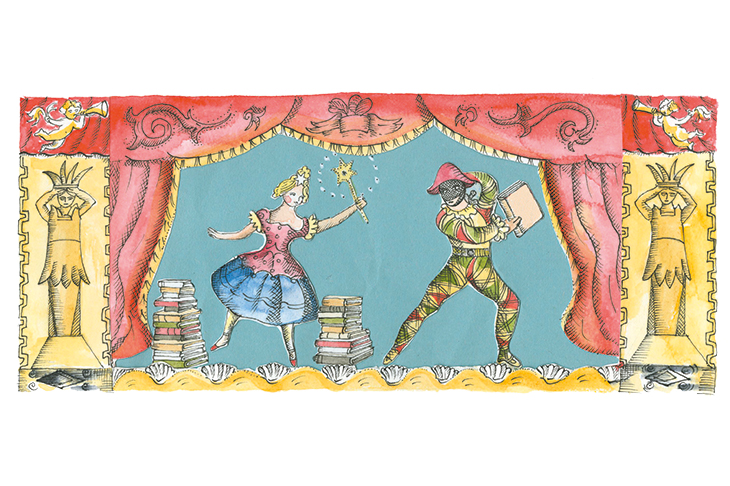
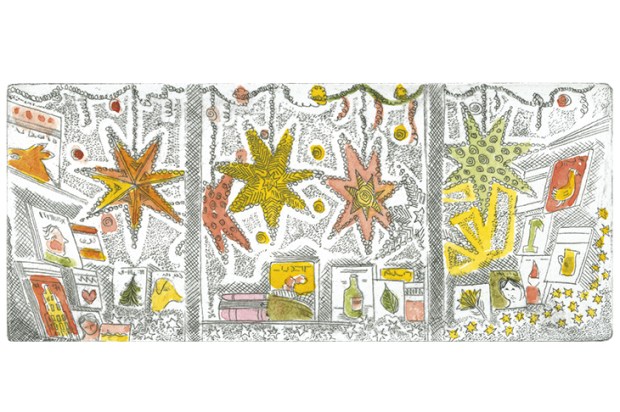

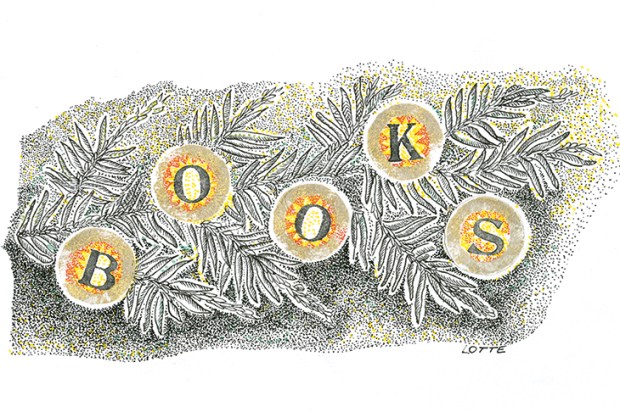

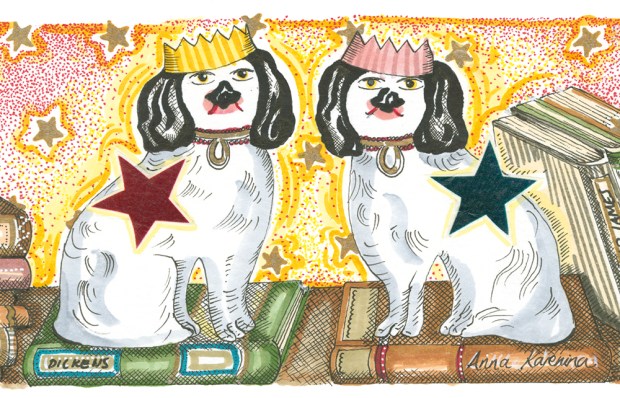
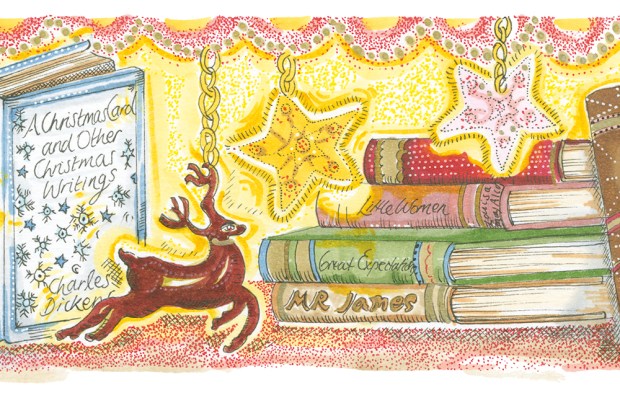






Comments
Don't miss out
Join the conversation with other Spectator Australia readers. Subscribe to leave a comment.
SUBSCRIBEAlready a subscriber? Log in